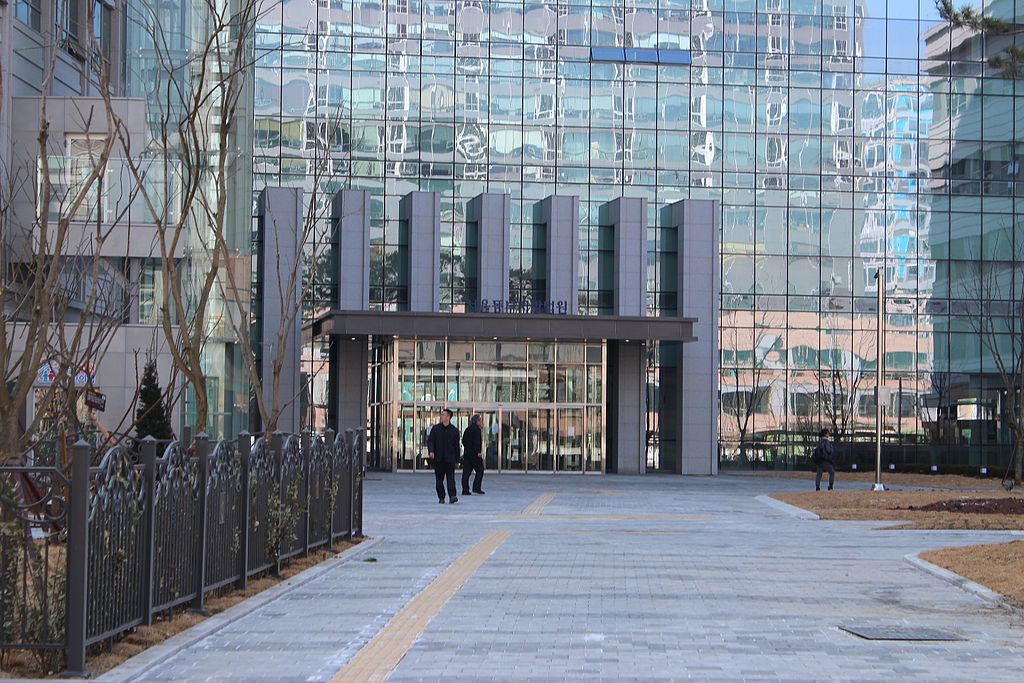Two Vietnamese Nationals Sentenced for Using Tether in Money Laundering Scheme
In a significant case that underscores the challenges posed by cryptocurrency in illicit activities, a South Korean court has sentenced two Vietnamese nationals to two years in prison each for their involvement in a sophisticated cross-border money laundering operation. Using Tether (USDT), a widely-used stablecoin, the pair facilitated the transfer of funds generated from voice phishing scams, further complicating the already contentious dialogue around digital currencies.
 The Seoul Eastern District Court, in Seoul, South Korea. (Source: Pectus Solentis [CC BY-SA 4.0])
The Seoul Eastern District Court, in Seoul, South Korea. (Source: Pectus Solentis [CC BY-SA 4.0])
Fraud through Cryptocurrency: The Scheme Revealed
The two defendants, identified only by their surnames, Duong and Pham—both 23 and part of a criminal operation—were arrested following an investigation into the voice phishing scam that targeted victims across South Korea. According to details released by Financial News, the pair came into contact with the scam network back in October of the previous year through a Telegram open chat room, which served as a recruitment channel for criminal activities.
Once enlisted, Duong and Pham were instructed to convert proceeds from the scams, initially collected in South Korean won, into USDT. What followed was a systematic transfer of these digital assets to a crypto wallet linked to the scam’s organizers based in Vietnam. They received commissions ranging from 50,000 won (approximately $36.44) to 100,000 won (approximately $72.88) for every 10 million won (about $7,288) worth of USDT they transferred.
Collateral Damage: The Impact of Voice Phishing
This was not a straightforward operation; the voice phishing scheme involved a network of perpetrators who deftly impersonated trusted figures such as credit card delivery personnel, insurance agents, and even public prosecutors. Their tactics included fraudulent calls designed to deceive victims into believing their bank accounts were at risk, prompting them to confirm sensitive information or make hasty financial decisions.
The Seoul Eastern District Court recognized the severity of these crimes during sentencing. The presiding judge, Lee Jeong-hyeong, stated, “Even if the defendants did not orchestrate the crime, they must be severely punished. They played an essential role in the crime, acting as intermediaries.” While the court chose not to impose a harsher sentence due to the defendants’ lack of prior criminal records, it emphasized the importance of accountability in preventing future offenses.
📌 Why This Matters
The rise of cryptocurrencies like Tether in Asia can act as both an opportunity and a challenge. This case illustrates the darker side of blockchain technology, revealing the vulnerabilities that come with the anonymity and speed cryptocurrencies offer. As digital currencies gain traction globally, it is crucial for regulators to establish frameworks that prevent abuse while enabling innovation. This incident signals an urgent need for more robust measures to safeguard consumers from scams and fraud in the evolving digital financial landscape.
🔥 Expert Opinions on the Case
Experts in cryptocurrency regulation suggest that cases like this highlight the necessity for enhanced regulatory oversight. “We’re witnessing the double-edged sword of innovation,” says Dr. Hae Jung, a financial crime analyst. “While cryptocurrencies offer unprecedented convenience, they can also serve as vehicles for crime if left unchecked.” Analysts argue that countries like South Korea need to step up their game, potentially implementing stricter anti-money laundering (AML) regulations tailored for the crypto space to curb such activities.
🚀 Future Outlook: What Lies Ahead for Crypto in Korea?
Given the increasing popularity of USDT and similar digital currencies in South Korea, it’s crucial to ask: What does the future hold for cryptocurrency regulations? The authorities may be prompted to rethink their strategies following this incident. Expect to see more discussions surrounding the establishment of clearer legal frameworks for cryptocurrencies, aimed not only at fighting fraud but also at nurturing a safe environment for innovation.
Conclusion
The sentencing of Duong and Pham serves as a stark reminder of the risks associated with the burgeoning cryptocurrency industry. Their role in a complex money laundering scheme fueled by voice phishing scams encapsulates the pressing need for regulatory vigilance. As the cryptocurrency landscape in South Korea continues to evolve, will lawmakers rise to the challenge and implement measures that protect consumers without stifling growth? Join the conversation and let us know your thoughts in the comments below!

